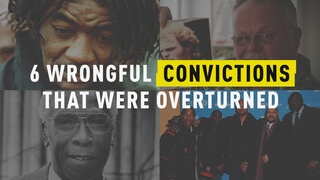Create a free profile to get unlimited access to exclusive videos, breaking news, sweepstakes, and more!
Sentenced To Life At Age 15, 82-Year-Old Man Tastes Freedom Once Again
Joe Ligon was the oldest juvenile lifer in the U.S. at the time of his release, made possible by a series of court rulings on the constitutionality of sentences like his.

The nation’s oldest juvenile lifer walked out of prison Thursday morning after spending 68 years behind bars.
Joe Ligon, 82, was released from prison at 7:45 a.m. Thursday, nearly seven decades after he began his sentence in December 1953 at the age of 15, Maria A. Bivens, press secretary for the Pennsylvania Department of Corrections confirmed to Oxygen.com.
In Ligon’s first hours of freedom as he traveled to the public defender’s City Center office, he was struck by the size of the massive buildings that had been erected in the years since he was incarcerated.
“I’m looking at all the tall buildings,” he told The Philadelphia Inquirer. “This is all new to me. This never existed.”
Ligon was convicted of first-degree murder charges after he and a group of teens were accused in a string of drunken attacks in South Philadelphia that left two dead and six injured, according to a 1953 account of the crime in The Philadelphia Inquirer.
Police at the time said the teens had been part of a newly formed gang known as the “head hunters.” The group downed several bottles of wine before attacking their victims during a string of robberies and assaults with switchblades, according to authorities.
Charles Pitts, 51, and Jackson Hamm, 65, were killed in the deadly crime spree, the paper reported in 2017.
Prosecutors described Ligon as responsible for both murders.
Ligon admitted taking part in the crime spree, but said he didn't kill anyone. He did admit to stabbing another person, who survived the attack.
He was sentenced to life in prison.
However, after the U.S. Supreme Court ruled that automatic life terms for children were considered cruel and unusual, he was re-sentenced in 2017 to 35 years to life in prison, the paper reports.
Although he was immediately eligible for parole, according to court records, Ligon refused to apply.
“I like to be free,” he said. “With parole, you got to see the parole people every so often. You can’t leave the city without permission from parole. That’s part of freedom for me.”
Bradley Bridge, a lawyer with the Defender Association of Philadelphia, has been representing Ligon since 2006 and fought for the last three years to get him released due to time served.
He won a major victory in federal court in November 2020 after arguing that a mandatory maximum life sentence in Ligon’s case was unconstitutional and not “individualized” as the Constitution requires.
U.S. District judge Anita B. Brody agreed and ruled that Ligon needed to be resentenced for the crime or released within 90 days. On Thursday, that 90-day time frame expired, leaving Ligon a free man.
Ligon, who had grown up on a farm in Alabama, had a difficult life before his arrest, the Inquirer reports. He dropped out of school in the third or fourth grade. Although he tried school again as a teenager once his family moved to Philadelphia, he struggled and soon fell in with the group of troubled teens.
Behind bars, Ligon learned to read and write and trained as a boxer, the paper reports.
Various community agencies joined together to find Ligon a place to live upon his release. With the help of the Philadelphia Corporation of Aging, Ligon plans to stay in domiciliary care, described as a foster-care-like arrangement with another family in the Philadelphia area.
Other former juvenile lifers—including John Pace, who now works as a reentry coordinator for the Youth Sentencing & Reentry Project—plan to help him acclimate to his new world.
“He’s been locked up so long, everything changed,” Pace told the paper.























